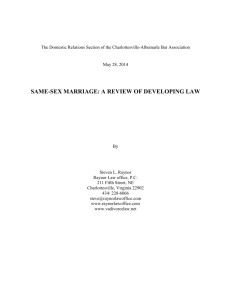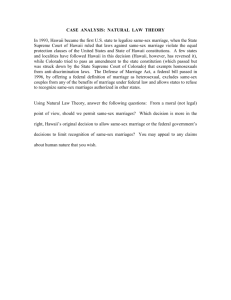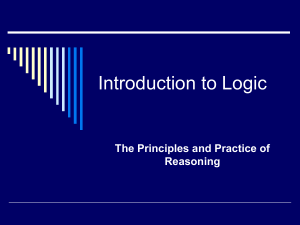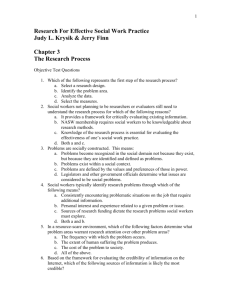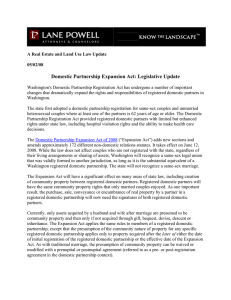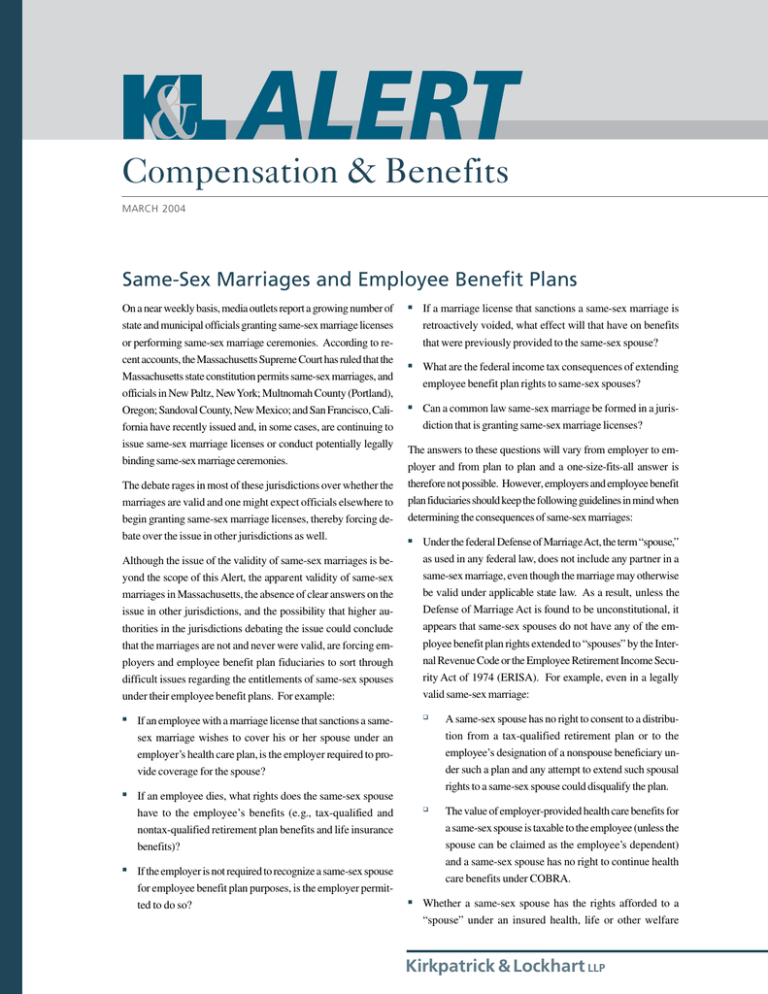
Compensation & Benefits
MARCH 2004
Same-Sex Marriages and Employee Benefit Plans
On a near weekly basis, media outlets report a growing number of
state and municipal officials granting same-sex marriage licenses
or performing same-sex marriage ceremonies. According to recent accounts, the Massachusetts Supreme Court has ruled that the
Massachusetts state constitution permits same-sex marriages, and
officials in New Paltz, New York; Multnomah County (Portland),
Oregon; Sandoval County, New Mexico; and San Francisco, California have recently issued and, in some cases, are continuing to
issue same-sex marriage licenses or conduct potentially legally
binding same-sex marriage ceremonies.
The debate rages in most of these jurisdictions over whether the
marriages are valid and one might expect officials elsewhere to
begin granting same-sex marriage licenses, thereby forcing debate over the issue in other jurisdictions as well.
If a marriage license that sanctions a same-sex marriage is
retroactively voided, what effect will that have on benefits
that were previously provided to the same-sex spouse?
What are the federal income tax consequences of extending
employee benefit plan rights to same-sex spouses?
Can a common law same-sex marriage be formed in a jurisdiction that is granting same-sex marriage licenses?
The answers to these questions will vary from employer to employer and from plan to plan and a one-size-fits-all answer is
therefore not possible. However, employers and employee benefit
plan fiduciaries should keep the following guidelines in mind when
determining the consequences of same-sex marriages:
Although the issue of the validity of same-sex marriages is beyond the scope of this Alert, the apparent validity of same-sex
marriages in Massachusetts, the absence of clear answers on the
issue in other jurisdictions, and the possibility that higher authorities in the jurisdictions debating the issue could conclude
that the marriages are not and never were valid, are forcing employers and employee benefit plan fiduciaries to sort through
difficult issues regarding the entitlements of same-sex spouses
under their employee benefit plans. For example:
Under the federal Defense of Marriage Act, the term “spouse,”
as used in any federal law, does not include any partner in a
same-sex marriage, even though the marriage may otherwise
be valid under applicable state law. As a result, unless the
Defense of Marriage Act is found to be unconstitutional, it
appears that same-sex spouses do not have any of the employee benefit plan rights extended to “spouses” by the Internal Revenue Code or the Employee Retirement Income Security Act of 1974 (ERISA). For example, even in a legally
valid same-sex marriage:
If an employee with a marriage license that sanctions a samesex marriage wishes to cover his or her spouse under an
employer’s health care plan, is the employer required to provide coverage for the spouse?
If an employee dies, what rights does the same-sex spouse
have to the employee’s benefits (e.g., tax-qualified and
nontax-qualified retirement plan benefits and life insurance
benefits)?
A same-sex spouse has no right to consent to a distribution from a tax-qualified retirement plan or to the
employee’s designation of a nonspouse beneficiary under such a plan and any attempt to extend such spousal
rights to a same-sex spouse could disqualify the plan.
The value of employer-provided health care benefits for
a same-sex spouse is taxable to the employee (unless the
spouse can be claimed as the employee’s dependent)
and a same-sex spouse has no right to continue health
care benefits under COBRA.
If the employer is not required to recognize a same-sex spouse
for employee benefit plan purposes, is the employer permitted to do so?
Whether a same-sex spouse has the rights afforded to a
“spouse” under an insured health, life or other welfare
Kirkpatrick & Lockhart LLP
benefit plan is generally determined by reference to the terms
of the underlying insurance policy. Employers should review
their policies to determine the impact of same-sex
marriages, and their potential retroactive nullification. If the
employer desires a result contrary to the result dictated by the
policy, the employer will need to negotiate a change in the
terms of the policy with the insurer.
whom they are married clearly do have rights under ERISA that
may be affected by same-sex marriages. Thus, whatever discretion an employer may have to set the ground rules prospectively,
ERISA may protect any benefits to which same-sex couples may
already have become entitled.
The terms of self-insured welfare plans are not, of course,
governed by insurance policies. Employers should review
their plan documents to ensure that their plans clearly provide
the coverage that the employer wishes to provide, both in terms
of coverage of same-sex marriages and in terms of the consequences of a retroactive nullification of a same-sex marriage.
For example, an employer can elect to voluntarily extend selfinsured health care coverage and COBRA rights to a same-sex
spouse, even if the marriage is determined to be invalid. (Employers that wish to extend coverage to same-sex spouses should
first consider whether such a benefit would be covered by the
employer’s stop-loss insurance policy.) Whatever the employer
decides, self-insured employers should consider adopting a
policy, through formal plan amendment or otherwise, regarding the rights of individuals with same-sex marriage licenses
and communicating that policy to employees. A similar approach can generally be taken with respect to the rights of samesex spouses under an employer’s nontax-qualified retirement
plans.
The validity of same-sex marriages in some jurisdictions does
not automatically preclude an employer from maintaining a
same-sex domestic partner policy in those jurisdictions or
elsewhere. An employer that has a pre-existing same-sex
domestic partner policy may wish to consider whether it makes
sense to continue the policy in jurisdictions where same-sex
marriages are valid.
Above all, because most employee benefit plans are subject to the
requirements of ERISA, employers should proceed cautiously
when considering the impact of same-sex marriages on their
employee benefit plans. Although same-sex spouses do not have
rights as “spouses” under ERISA, they may have rights as “beneficiaries” under ERISA and, in any event, the employees to
MICHAEL A. HART
412.355.6211
mhart@kl.com
If you have questions or would like more information about
K&L’s Employee Benefit Plans/ERISA practice, please contact
one of our compensation and benefits lawyers listed below:
Boston
Stephen E. Moore
617.951.9191
smoore@kl.com
Los Angeles
William P. Wade
310.552.5071
wwade@kl.com
New York
David E. Morse
212.536.3998
dmorse@kl.com
Pittsburgh
William T. Cullen
Michael A. Hart
J. Richard Lauver
Charles R. Smith
Richard E. Wood
Linda B. Beckman
Sonia A. Chung
Douglas J. Ellis
412.355.8600
412.355.6211
412.355.6454
412.355.6536
412.355.8676
412.355.6528
412.355.6716
412.355.8375
wcullen@kl.com
mhart@kl.com
rlauver@kl.com
csmith@kl.com
rwood@kl.com
lbeckman@kl.com
schung@kl.com
dellis@kl.com
San Francisco
Laurence A. Goldberg
Katherine L. Aizawa
Marc R. Baluda
415.249.1043
415.249.1044
415.249.1036
lgoldberg@kl.com
kaizawa@kl.com
mbaluda@kl.com
Washington
Catherine S. Bardsley
William A. Schmidt
David Pickle
Lori G. Galletto
202.778.9289
202.778.9373
202.778.9887
202.778.9024
cbardsley@kl.com
william.schmidt@kl.com
dpickle@kl.com
lgalletto@kl.com
Æ
Kirkpatrick & Lockhart LLP
Challenge us. Æ
www.kl.com
BOSTON
■
DALLAS
■
HARRISBURG
■
LOS ANGELES
■
MIAMI
■
NEWARK
■
NEW YORK
■
PITTSBURGH
■
SAN FRANCISCO
■
WASHINGTON
...............................................................................................................................................................
This publication/newsletter is for informational purposes and does not contain or convey legal advice. The information herein
should not be used or relied upon in regard to any particular facts or circumstances without first consulting a lawyer.
© 2004 KIRKPATRICK & LOCKHART LLP.
ALL RIGHTS RESERVED.


